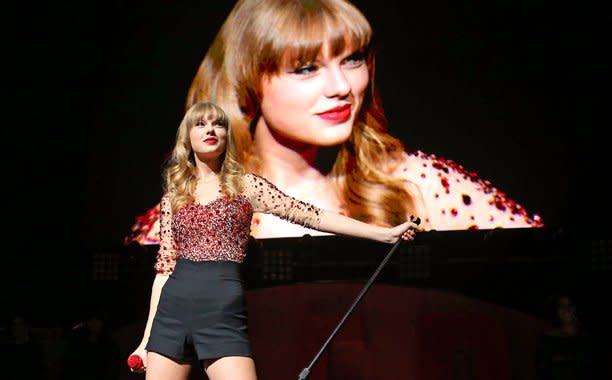Taylor Swift vs. Spotify: A timeline

Taylor Swift’s 1989 dropped Oct. 27. Just a week later, all her music disappeared from Spotify.
This caused some confusion among fans—and caused Spotify to panic. Since Nov. 3, the two parties have gone back and forth about the whys behind Swift’s move. Swift says she believes art should have value, and she doesn’t think Spotify conveys this message; Spotify maintains that its goal from the beginning has been to help fans listen to music while also giving artists their due.
It’s messy, and, as Swift said in a Time interview, “really kind of an old story”—she first publicized her views about paying for music this past summer. But since her decision to yank her songs from the site made that story new again, here’s a complete rundown of who’s said what so far.
July 7
The Wall Street Journal recruits Swift to imagine the future of the music industry in its “The Future of Everything” package. In the op-ed, she writes:
undefined
She’ll later refer to this op-ed when she tells Time that her aversion to Spotify is old news.
Oct. 27
Swift’s fifth album, 1989, sells over 600,000 copies in its first day. A search for the album on Spotify brings up these message: “The artist or their representatives have decided not to release this album on Spotify. We are working on it and hope they will change their mind soon.” At this point, Swift’s other albums are still available on the streaming service.
Nov. 3
Most of Swift’s songs disappear from Spotify, save for a few from soundtracks like The Hunger Games and The Hannah Montana Movie. Spotify responds by issuing a cutesy statement, using Swift’s own lyrics to tempt the singer back to them: “Taylor, we were both young when we first saw you, but now there’s more than 40 million of us who want you to stay, stay, stay.”
More seriously, the company also clarify that its mission is to help fans “listen to music wherever and whenever they want” and that “artists have an absolute right to be paid for their work and protected from piracy.” To help fans through the tough time, it even offers a playlist of songs with titles that spell out a poem asking Swift to return.
Nov. 6
Swift calls up Yahoo! to talk about her album—and her decision to leave Spotify. “All I can say is that music is changing so quickly, and the landscape of the music industry itself is changing so quickly, that everything new, like Spotify, all feels to me a bit like a grand experiment,” she says. “And I’m not willing to contribute my life’s work to an experiment that I don’t feel fairly compensates the writers, producers, artists, and creators of this music.”
She says she was originally open-minded about putting her new music on Spotify, then changed her mind. “I felt like I was saying to my fans, ‘If you create music someday, if you create a painting someday, someone can just walk into a museum, take it off the wall, rip off a corner of it, and it’s theirs now and they don’t have to pay for it.’ I didn’t like the perception that it was putting forth.”
Nov. 11
Spotify’s CEO Daniel Ek issues a statement agreeing with Swift, but also standing up for his company. “Taylor Swift is absolutely right: music is art, art has real value, and artists deserve to be paid for it,” he writes. “We started Spotify because we love music and piracy was killing it.”
In the lengthy post, he explains Spotify’s model and how he wants to help the music industry—not destroy it. “We’re trying to build a new music economy that works for artists in a way the music industry never has before,” he writes. “And it is working—Spotify is the single biggest driver of growth in the music industry, the number one source of increasing revenue, and the first or second biggest source of overall music revenue in many places.”
Nov. 12
Scott Borchetta, the CEO of Big Machine (Swift’s label), tells Time that Spotify paid Swift less than $500,000 in the past year to stream her songs in the U.S. In the same story, a Spotify spokesperson claims they’ve paid Swift $2 million in the past year to stream her songs globally.
Nov. 13
Time publishes an interview with Swift, starting off the chat by asking her about the Spotify decision. “Everybody’s complaining about how music sales are shrinking, but nobody’s changing the way they’re doing things,” she says. “They keep running towards streaming, which is, for the most part, what has been shrinking the numbers of paid album sales.”
And as for what she has to say to fans who are upset they can’t listen to her music on Spotify anymore? “Well, they can still listen to my music if they get it on iTunes.” Looks like Swift and Spotify are never, ever getting back together.
